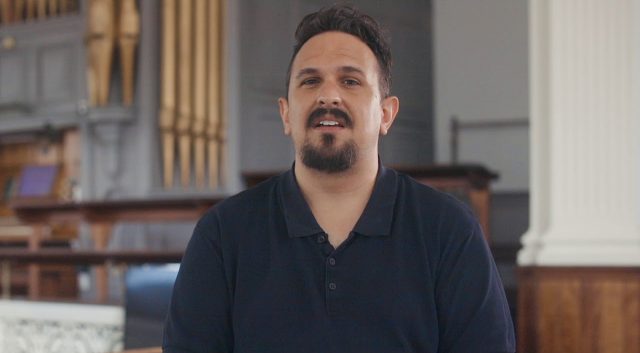John Wimber writes about the Cross, his personal discovery of the importance of the Cross and the night he gave his life over to Jesus.
When my wife, Carol, and I walked into our first home Bible study back in 1963 I had no interest in learning about the cross. I only wanted to learn about God.
Why do you keep talking about Jesus? I want to find out about God.
But the leader, Gunner Payne, kept talking about Jesus and his death on the cross. I asked him, “Why do you keep talking about Jesus? I want to find out about God.”
“Okay,” Gunner said, “let’s turn to the Old Testament. It was written before Jesus’ time. Let’s see what it has to say about God.” He spent the next few weeks showing me how Jesus fulfilled perfectly the Old Testament predictions of the Messiah. I learned that in the New Testament the word “cross” is a summary description of the good news that Christ “died for our sins” (1 Cor. 1:18). It encompasses the death, burial, and resurrection of Jesus, the heart of his work on earth.
In the minds of the first Christians the cross was a symbol of all that is holy and precious. This is remarkable, because until Christ died on the cross it was considered the most vile and repulsive of objects. Rome thought it was too base for her own citizens’ punishment. By tradition, Peter, a noncitizen, was crucified; Paul, a citizen, was beheaded.
Three critical elements that separate the cross from other events in history: motivation, necessity, and relevance.
As the weeks rolled by, the cross began making historical sense to me. But it made no impact on me personally. I thought, “Jesus is God; Jesus died on the cross; so what?” I failed to understand three critical elements that separate the cross from other events in history: motivation, necessity, and relevance.
Motivation
How could a loving Father plan his own Son’s crucifixion? Some people think that God arbitrarily decided to bail humanity out of a bad jam. It was as though he looked down from heaven as men were killing his Son and said to himself, “Well, that’s okay. I think I’ll invent a sacrificial system and use that to save humanity. One man dying for the human race is a noble idea.”
Christ shed his blood on the cross so that we may have eternal life.
But Scripture paints a different, far more compassionate and intelligent picture of the Father. First and foremost, he was motivated by love for you and me. Only an eternal sacrifice could overcome the barrier of sin that we erected. “For God so loved the world,” the apostle John writes, “that he gave his one and only Son…” (John 3:16). “God was pleased” that Christ shed his blood on the cross so that we may have eternal life (Col. 1:19-20). Jesus “gave himself for our sins to rescue us from the present evil age, according to the will of our God and Father” (Gal. 1:4). The Father’s plan was rooted in love, and his Son obeyed it.
God’s love was so great that he required more of himself than he does of us. One of the greatest stories of the Old Testament illustrates this well. Genesis 22 describes God testing Abraham. God said, “Take your son, your only son, Isaac, whom you love, and go to the region of Moriah. Sacrifice him there as a burnt offering” (v. 2). Think of the impact that God’s words had on Abraham. He was an old man, and Isaac was his child of promise, the apple of his eye. He loved him more than anything in the world. But God said, “Kill the boy. Now. Obey.”
Isaac was spared; Jesus was crucified. How great was the love that motivated the Father. No wonder we will worship the Father for eternity.
We often forget that Isaac was old enough to help carry the wood up the mountain for his own sacrifice. He even asked Abraham where the sacrifice was. “God himself will provide the lamb…” was Abraham’s reply (v. 8). Then Isaac was bound and placed on the wood, under the shadow of Abraham’s raised knife.
Abraham and Isaac are prophetic types of the Father and the Son, shadows of what God fulfilled at the cross centuries later. But God didn’t require of Abraham and Isaac what he required of himself. “Do not lay a hand on the boy,” an angel told Abraham. Isaac was spared; Jesus was crucified. How great was the love that motivated the Father. No wonder we will worship the Father for eternity.
Necessity
But it wasn’t only the Father’s love that sent Jesus to the cross, it was also his justice. Romans 1:18 says, “The wrath of God is being revealed from heaven against all the godlessness and wickedness of men who suppress the truth by their wickedness….” His wrath isn’t a petulant, irrational burst of anger, such as humans often exhibit, but a holy, just revulsion against what is contrary to and opposes his holy nature and will. The law, especially the moral teaching revealed to Moses at Sinai and which is summarised in the Ten Commandments, is a reflection of God’s character (Rom. 5:13,20; Gal. 3:17-20). The law is holy and good (Rom 7:12). In addition to revealing God’s nature, it tells us a lot about ourselves. It gives us a consciousness of sin (Rom. 3:20), even stimulating sin in us so we know of our great need of Christ’s redemption (Rom. 7:5). But there are some things that the law cannot do. It is not able to make right those who sin by breaking it, nor can it provide the power to fulfil its demands (Rom. 3:20; Heb. 7:19).
The cross is his solution
So there is nothing we can do to remove the chasm created by sin between God and us. Even if we were able to live perfect lives after we became conscious that we were sinners, we could do nothing to take away the guilt of our earlier sin.
God’s justice demands our death and his love desires our justification. The cross is his solution: “…he did it [sent Jesus to the cross to demonstrate his justice at the present time, so as to be just and the one who justifies those who have faith in Jesus” (Rom. 3:26). The guilt of our sin must be destroyed by death (1 John 3:4-5).
Reconciliation
The work of the cross is a work of reconciliation. Second Corinthians 5:17-19 says, “…if anyone is in Christ, he is a new creation; the old has gone, the new has come! All this is from God, who reconciled us to himself through Christ…” The Greek word translated “reconciled” in this passage indicates the changing of enmity to friendship. Because of the cross, God may now be friends with us. Romans 5:10 says we were once “God’s enemies” but now are “reconciled to him through the death of his Son.”
Forgiveness through Christ’s atoning sacrifice must be received by faith.
Colossians 1:19-20 says, “God was pleased…through him [Jesus] to reconcile to himself all things, whether things on earth or things in heaven, by making peace through his blood, shed on the cross.” When Adam and Eve sinned, harmony between God and man was destroyed and disorder entered creation (Rom. 8:19-20). The cross makes peace possible between God and man, in principle restoring harmony in the physical and spiritual world, though its full realisation will come only when Christ returns (Rom. 8:21).
This does not mean that Christ saves all people. Scripture speaks of an eternal hell and makes it clear that only believers are saved. Forgiveness through Christ’s atoning sacrifice must be received by faith. Universalism, the idea that all people will ultimately be saved, is not scriptural.
Satan defeated
For God to reconcile himself to all things Jesus also had to defeat Satan and his cohorts at the cross. Colossians 2:15 says, “And having disarmed the powers and authorities, he made a public spectacle of them, triumphing over them by the cross.” The “powers and authorities” are evil angels. The picture is of conquered soldiers stripped of their clothes as well as their weapons to symbolise their total defeat.
Out of love, God sent his Son
The shedding of Christ’s blood on the cross touches on what theologians call the doctrine of the atonement. Hebrews 2:17 says Jesus is fully human in order “…that he might make atonement for the sins of the people” (also see 1 John 2:2). To “atone” means to turn aside God’s wrath and make him favourably inclined.
Out of love, God sent his Son to make substitutionary atonement for the believer’s sin. In this way the Father’s wrath is satisfied and appeased; his wrath against Christians’ sin is turned away and directed toward Christ. We are the guilty ones, not he. Yet he chose to become like us (2 Cor. 5:21), and permitted himself to be offered on the cross for our sins (Rom. 4:25). This results in forgiveness of sin.
The atonement accomplishes more than forgiveness of sin. It is also the basis for his righteousness being imputed to us. Paul says, “Consider Abraham: ‘He believed God, and it was credited to him as righteousness'” (Gal. 3:6). When we put our faith in Christ we become so closely identified with him that we are declared righteous—Christ’s righteousness is credited to us!
Union with Christ
The cross is also the symbol of our union with Christ, not simply because we follow his example, but because of what he has done for us and in us. Because of his substitutionary death for us on the cross we “all died” (2 Cor. 5:14). Paul says, “I have been crucified with Christ and I no longer live, but Christ lives in me” (Gal. 2:20).
Our union with Christ on the cross frees us from the power of sin in our lives. Romans 6:6 says, “For we know that our old self was crucified with him so that the body of sin might be done away with, that we should no longer be slaves to sin.” The Holy Spirit transforms our hearts. We no longer desire or find happiness in sinning. We now “count [ourselves] dead to sin but alive to God in Christ Jesus” (Rom. 6:11).
Relevance
After I had studied the Bible with Gunner Payne for about three months I could have passed an elementary exam on the cross. I understood there is one God who could be known in three Persons. I understood Jesus is fully God and fully man and he died on the cross for the sins of the world. But I didn’t understand that I was a sinner.
I thought I was a good guy. Oh, I knew I had messed up here and there, but I didn’t realise how serious my condition was.
Carol was a better person than I, yet she thought she was a sinner.
But one evening around this time Carol said to Gunner, “I think it’s time to do something about all that we’ve been learning.” Then, as I looked on in utter amazement, she kneeled down on the floor and started praying to what seemed to me to be the ceiling plaster. “Oh God,” she said, “I’m sorry for my sin.”
I couldn’t believe it. Carol was a better person than I, yet she thought she was a sinner. I could feel her pain and the depth of her prayers. Soon she was weeping and repeating “I’m sorry for my sin.”
There were six or seven people in the room, all with their eyes closed. I looked at them and then it hit me: They’ve all prayed this prayer too! I started sweating bullets. I thought I was going to die.
“I’m not going to do this. This is dumb. I’m a good guy.”
The perspiration ran down my I face, and I thought, “I’m not going to do this. This is dumb. I’m a good guy.”
Then it struck me. Carol wasn’t praying to the plaster; she was praying to a person, to a God who could hear her. In comparison to him, she knew she was a sinner in need of forgiveness.
I had turned away from that love; I had shunned it all of my life.
In a flash the cross made personal sense to me. Suddenly I knew some thing that I had never known before: I had hurt God’s feelings. I le loved me, and in his love for me he sent Jesus. But I had turned away from that love; I had shunned it all of my life. I was a sinner, desperately in need of the cross.
Then I too was kneeling on the floor, sobbing, nose running, eyes watering, every square inch of my flesh perspiring profusely. I had this overwhelming sense that I was talking with someone who had been with me all of my life, but whom I had failed to recognise. Like Carol, I began talking to the living God, telling him that I was sinner. About the only words I could say aloud were “Oh God! Oh God! Oh God!”
I knew something revolutionary was going on inside of me. I thought, “I hope this works, because I’m making a complete fool of myself.” Then the Lord brought to mind a man I had seen in Pershing Square in Los Angeles a number of years before. He was wearing a sign that said, “I’m a fool for Christ. Whose fool are you?” I thought at the time, “That’s the most stupid thing I’ve ever seen.” But as I kneeled on the floor I realised the truth of the odd sign: the cross is foolishness “to those who are perishing” (1 Cor. 1:18).
That night I knelt at the cross and believed in Jesus. I’ve been a fool for Christ ever since.









